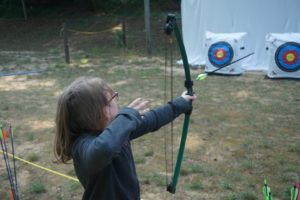Week 4- Riley Week and Conservation Connection at Camp
Week four of the camp is always an exciting time for our campers and staff. Traditionally this week has the newest faces joining us at Cedar Lake. Have you ever been excited about a new experience, but were a little unsure of what to expect? For many campers this week, the answer to this question would be a resounding, “YES!” Not only did many of the campers come to camp for the first time, but this is also their first time away from their families and for many of them their first time being in the woods away from the lights of the city.

With a full roster of 80 kids this week we also had a pretty crowded hunter safety course this. Our staff was excited to be at capacity and busy helping campers overcome homesickness and engaging them in new experiences.
Many campers this week came to us as Riley Wilderness Youth Camp scholarship recipients. The Riley Scholarship program was established by George Riley through the Riley Foundation and works in partnership with SCI-Novi and MUCC. Mr. Riley created this opportunity to increase youth participation in the outdoors. Youth received scholarships based on four criteria: 1) they have limited experience hunting and in the outdoors, 2) they lack financial resources to attend a conservation education program, 3) they do not have a mentor to expose them to the outdoors, or 4) they do not possess a hunter safety card.
The curriculum that our staff teaches during this week is our sampler program. The Riley Wilderness Jr. Campers all go through the conservation connection programming. Campers learned how to fish, played predator-prey games, and tried their hands at shooting sports. The also spent time in kayaks and exploring the bog and trails throughout Waterloo. Getting kids engaged in the outdoors and teaching them skills is what camp is all about. Our goal is to help show them there are many different activities they can excel at in regards to an active outdoor lifestyle.

With our fourth week in the books, it was time to say goodbye to this week’s batch of campers but hope that their camp experiences will have a lasting impact on their lives and enjoyment of the outdoors. I hope that these hands-on experiences helped campers understand the importance of our natural resources and help increase their desire to assume their role as land stewards and conservationists.
The post Week 4- Riley Week and Conservation Connection at Camp appeared first on Michigan United Conservation Clubs.
Recent Posts



